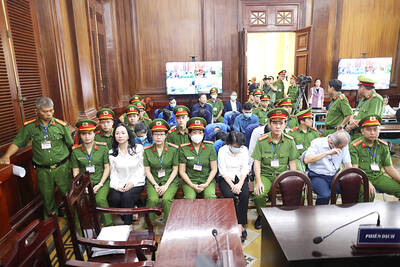She's a media mogul, she has a doctorate in political science and she learned to sing opera in secret because her father -- Kazakhstan's president -- disapproved.
Now, Dariga Nazarbayeva has formed a new political party, setting off speculation she is grooming herself for what could be the second dynastic succession in the countries that emerged from the disintegration of the Soviet Union.
It has already happened in Azerbaijan, and what unfolds in Kazakhstan, a resource-rich giant four times bigger than France, could influence the succession in its four smaller Central Asian neighbors.
Nazarbayeva's party -- Asar, or All Together -- was due to hold its first party congress yesterday in Almaty. She claims it will win half the seats in parliament in fall elections. On Tuesday, before getting a single member into parliament, Asar announced it had formed its own parliamentary faction with 10 sympathetic independents.
Nazarbayeva has said she won't seek a parliamentary seat herself and denies her party is a launch pad for her to succeed her father, Nursultan Nazarbayev.
"I'm not seeking office in the top echelons of so-called big politics," she said in a statement announcing the party's founding in October.
Alikhan Baimenov, co-chairman of the opposition Ak Zhol party, doesn't see a "high probability" of the 40-year-old Nazarbayeva becoming president.
"She's just only entered the political stage," he said. "We shall see."
Petr Svoik, head of another opposition party, Democratic Choice of Kazakhstan, says, "It will take more calculation and complicated maneuvering," because Kazakhstan has a multiparty system and experienced politicians.
But he believes the Nazarbayevs are "definitely" preparing a family succession.
Such speculation is growing in the region as its longtime leaders get older and increasingly resistant to democratization. Most are former communist bosses who have clung to power through controversial constitutional changes or questionable votes.
Talk of dynasties was fueled when Azerbaijan, a Caucasus state with close ties to Central Asia, elected President Geidar Aliev's son as his successor in October.
In Uzbekistan, rumors of dynastic politics are so rife that officials had to deny the president's daughter had married the foreign minister to keep the presidency in the family. In Kyrgyzstan, rumor has it that the country is actually run by the president's wife, and that she wants his job.
All this gossip and speculation, if nothing else, is testimony to the secretive, clannish politics in these states, whose efforts toward democratization are young and who are struggling for credibility.
Nazarbayev, 63, came to power in 1989 as the country's communist leader. Since the 1991 Soviet collapse, he has twice been elected president and also extended his term in a referendum.
He has no known health problems and enjoys the support of many Kazakhs who credit him for successful market reforms. He is eligible to run for another seven-year term in 2006.
But the opposition has grown more active and Nazarbayev has begun to show signs of jitteriness, jailing two opposition leaders and cracking down on opposition media.
Sergei Duvanov, an opposition activist, said Nazarbayeva needs her new Asar party to make her political name and be ready to take power.
"Aliev's example has shown that one needs a backup, who can take over when it's needed," he said.
The party's programs get generous coverage. The president's daughter heads Khabar, Kazakhstan's biggest media group, and in 10 years has turned a mediocre state TV channel into the country's most influential. She is an advocate for media freedom as leader of the Congress of Journalists of Kazakhstan.
Her party calls itself centrist and favors strong presidential rule under a democratic system. Colleagues praise her organizational skills and recruiting of competent people to further her goals.
Nazarbayeva studied history and political science at Moscow State University. She speaks Kazakh, Russian, English and Italian.
Trained for years as a mezzo-soprano, she gave her first solo concert at Almaty's National Opera House in 2001, performing pieces by Liszt, Offenbach and others. Profits from the concert went to World War II veterans.

Republican US lawmakers on Friday criticized US President Joe Biden’s administration after sanctioned Chinese telecoms equipment giant Huawei unveiled a laptop this week powered by an Intel artificial intelligence (AI) chip. The US placed Huawei on a trade restriction list in 2019 for contravening Iran sanctions, part of a broader effort to hobble Beijing’s technological advances. Placement on the list means the company’s suppliers have to seek a special, difficult-to-obtain license before shipping to it. One such license, issued by then-US president Donald Trump’s administration, has allowed Intel to ship central processors to Huawei for use in laptops since 2020. China hardliners

A top Vietnamese property tycoon was on Thursday sentenced to death in one of the biggest corruption cases in history, with an estimated US$27 billion in damages. A panel of three hand-picked jurors and two judges rejected all defense arguments by Truong My Lan, chair of major developer Van Thinh Phat, who was found guilty of swindling cash from Saigon Commercial Bank (SCB) over a decade. “The defendant’s actions ... eroded people’s trust in the leadership of the [Communist] Party and state,” read the verdict at the trial in Ho Chi Minh City. After the five-week trial, 85 others were also sentenced on

Conjoined twins Lori and George Schappell, who pursued separate careers, interests and relationships during lives that defied medical expectations, died this month in Pennsylvania, funeral home officials said. They were 62. The twins, listed by Guinness World Records as the oldest living conjoined twins, died on April 7 at the Hospital of the University of Pennsylvania, obituaries posted by Leibensperger Funeral Homes of Hamburg said. The cause of death was not detailed. “When we were born, the doctors didn’t think we’d make 30, but we proved them wrong,” Lori said in an interview when they turned 50, the Philadelphia Inquirer reported. The

RAMPAGE: A Palestinian man was left dead after dozens of Israeli settlers searching for a missing 14-year-old boy stormed a village in the Israeli-occupied West Bank US President Joe Biden on Friday said he expected Iran to attack Israel “sooner, rather than later” and warned Tehran not to proceed. Asked by reporters about his message to Iran, Biden simply said: “Don’t,” underscoring Washington’s commitment to defend Israel. “We are devoted to the defense of Israel. We will support Israel. We will help defend Israel and Iran will not succeed,” he said. Biden said he would not divulge secure information, but said his expectation was that an attack could come “sooner, rather than later.” Israel braced on Friday for an attack by Iran or its proxies as warnings grew of